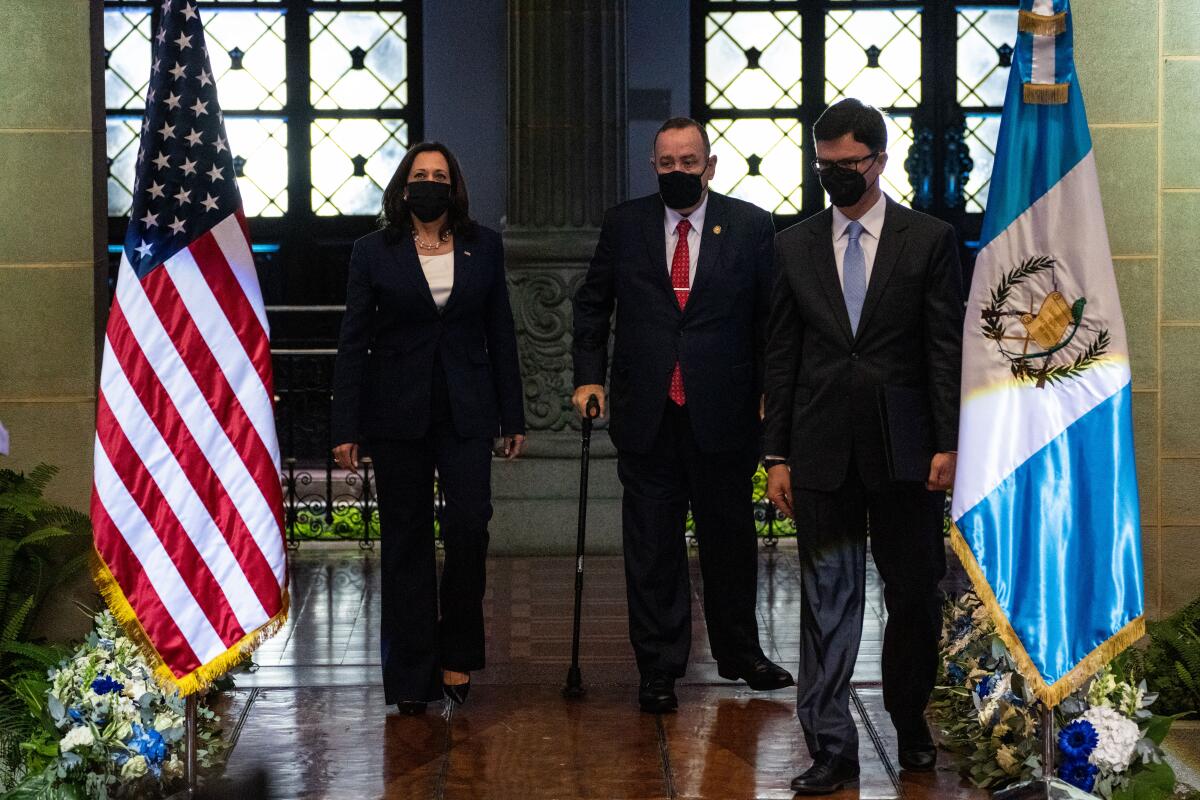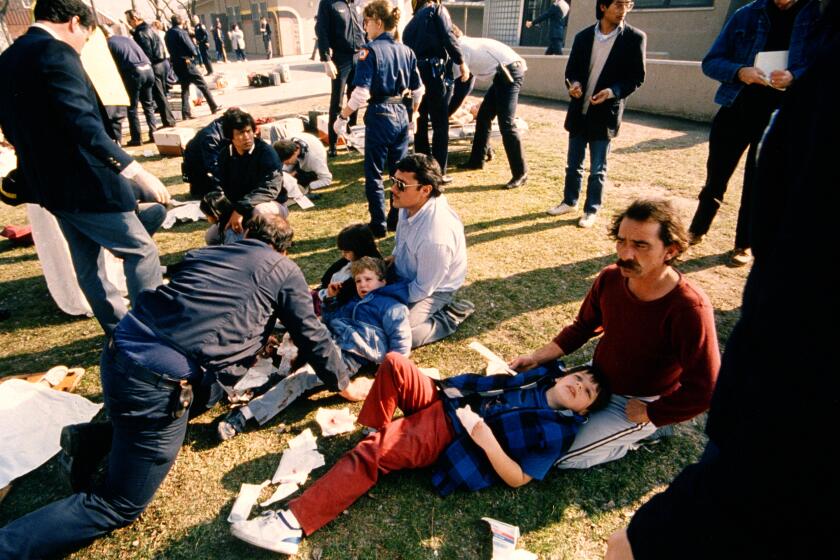Editorial: Biden needs bolder, more creative answers to Central American migration

- Share via
Vice President Kamala Harris’ quick two-day visit to Guatemala and Mexico won’t, obviously, fix the problems that have spurred tens of thousands of people to migrate northward. But the trip underscores the Biden administration’s recognition that addressing unsanctioned migration is more complicated than building a wall and denying migrants the right to seek asylum, which was the core of the Trump administration’s approach. Where the administration goes from here will be critical to making headway on the problem.
Harris and President Biden have told Central Americans contemplating migrating northward “don’t come over” because “you will be turned back.” Telling desperate migrants “don’t come” is reminiscent of Nancy Reagan’s admonition to would-be drug users: “Just say no.” A lot of good that did. People in Guatemala, Honduras and El Salvador generally don’t just wake up one morning and think, “You know, I want to move to the U.S.”
Clinical trials looked bad for Biogen’s pharmaceutical to treat Alzheimer’s. So how did it win approval over the objections of an FDA advisory panel?
Years of reporting by journalists and research by nongovernmental experts reveal the factors pushing people north: powerful gangs conscripting teenage boys, sexually abusing young women, extorting local businesses and committing astonishing levels of murder; corrupt governments unable or unwilling to take control; broken economies; and climate-change-driven droughts in agricultural regions that have made subsistence farming impossible. No slogans or admonitions are going to fix those problems, and until regional governments address the basic instability of their countries, their residents will continue to pack up and leave.
International aid is one obvious tool, but only if it is applied in workable ways. The U.S. has sent billions in aid over the years ($2.4 billion from 2013 through 2018), but relatively little of that has reached the people who need it most. A 2019 Government Accountability Office report declared that “limited information is available about how U.S. assistance improved prosperity, governance, and security in the Northern Triangle,” and found that the government lacked a comprehensive plan for determining how to allocate and account for the aid money it was spending.
Much of the aid, according to a recent New York Times report, goes to contracts with American organizations that take as much as 50% for administrative costs, including salaries, and often develop programs of questionable use, such as an app to give rural farmers instant access to market information for their crops. But an app isn’t very useful for people with sporadic access to cell towers or the internet. Another program built outhouses that went unused in a region with a pressing need for jobs and income.
A key hurdle is the endemic corruption in the Northern Triangle countries. The United Nations’ Commission Against Impunity in Guatemala began in 2007 to help prosecutors in Guatemala investigate and build cases against corrupt officials, leading to more than 300 convictions and the dismissal of 1,700 police officers. But when the organization, known by its Spanish acronym CICIG, turned its attention to the family of then-President Jimmy Morales, it was shut down. As Harris was heading to Central American, the White House announced a new anti-corruption task force, under which U.S. investigators are to help their Guatemalan counterparts. That’s a good start.
The federal court ruling tossing out California’s 30-year-old ban on assault weapons reads more like an NRA policy statement than a legal decision.
So the issue here seems to be less the notion of using foreign aid to stabilize governance and help relieve poverty than the practical realities of how that aid is directed and spent. The Biden administration earlier announced that it would not send aid to Northern Triangle governments because of the corruption, instead channeling it to nongovernment organizations. But that has created its own problems. In Mexico, some USAID money goes to the Mexicans Against Corruption and Impunity group investigating political malfeasance. President Andrés Manuel López Obrador on Monday asked the U.S. to suspend aid to the group, which he has accused of targeting his government. “It’s interference, it’s interventionism, it’s promoting coup plotters,” López Obrador said of the aid.
We broadly support using U.S. funds and pressure to stabilize the Northern Triangle as a counterweight to the factors promoting migration but also recognize that the money alone won’t solve the problem. In fact, some analysts suggest that increasing income for folks in impoverished areas could actually underwrite efforts to migrate. Experts have found that local levels of violence have a direct relationship with the population outflow. Pairing community-level anti-violence programs with a program for more generous and targeted work visas — allowing more people to enter the U.S. legally to work — could make a difference in reducing the numbers of people arriving at the border.
The daily crises that lead so many people to decide that the dangerous trek to the border is a safer alternative to staying put will not be easy to solve. This will take patience, bold policy visions, and the support of an American public that sees the human tragedies at hand.
More to Read
A cure for the common opinion
Get thought-provoking perspectives with our weekly newsletter.
You may occasionally receive promotional content from the Los Angeles Times.












